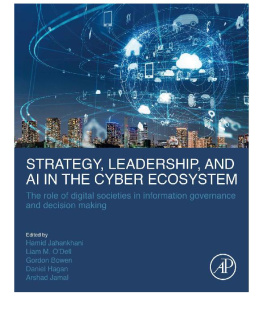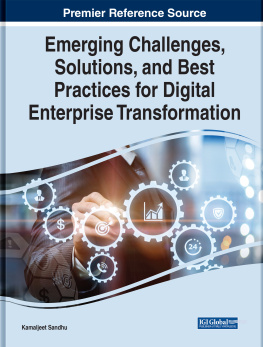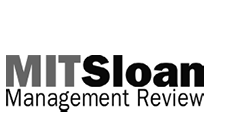What the Digital Future Holds
The Digital Future of Management
Paul Michelman, series editor
How to Go Digital: Practical Wisdom to Help Drive Your Organizations Digital Transformation
What the Digital Future Holds: 20 Groundbreaking Essays on How Technology Is Reshaping the Practice of Management
What the Digital Future Holds
20 Groundbreaking Essays on How Technology Is Reshaping the Practice of Management
MIT Sloan Management Review
The MIT Press
Cambridge, Massachusetts
London, England
2018 Massachusetts Institute of Technology
All rights reserved. No part of this book may be reproduced in any form by any electronic or mechanical means (including photocopying, recording, or information storage and retrieval) without permission in writing from the publisher.
Library of Congress Cataloging-in-Publication Data is available.
ISBN: 978-0-262-53499-4
EPUB Version 1.0
Contents
Paul Michelman
Tim OReilly
Ginni Rometty
Thomas H. Davenport
Andrew W. Moore
Reid Hoffman
Ajay Agrawal, Joshua S. Gans, and Avi Goldfarb
David H. Autor
Don Tapscott and Alex Tapscott
Rita Gunther McGrath
Paul Michelman
Bala Iyer, Andrew Burgert, and Gerald C. Kane
Robert D. Austin
Lynda Gratton
Monideepa Tarafdar
Catherine J. Turco
Bidhan L. Parmar and R. Edward Freeman
George Westerman
H. James Wilson, Paul R. Daugherty, and Nicola Morini-Bianzino
Andrew S. Winston
Bernd Schmitt, interviewed by Frieda Klotz
Series Foreword
Books in the Digital Future of Management series draw from the print and web pages of MIT Sloan Management Review to deliver expert insights and sharply tuned advice on navigating the unprecedented challenges of the digital world. These books are essential reading for executives from the worlds leading source of ideas on how technology is transforming the practice of management.
Paul Michelman
Editor in chief
MIT Sloan Management Review
Introduction: Tales from the Digital Frontier
Paul Michelman
The impact of digital technology on how businesses design and produce goods, interact with their supply chains, manage internal communication, and connect with customers is a rich topic that has been and continues to be broadly addressed in both commercial and academic business media.
But as the digital revolution enters its next phase, we find ourselves confronting a new set of questions about the relationship between technology and management. These questions go to the core of the organization:
How will big data inform hiring decisions?
What happens to marketing when marketers can map con-sumers brain patterns?
Are new communication technologies really delivering onthe promise to empower frontline workers, or are they unleashing organizational chaos?
What role will algorithms play in creating corporate strategy?
How do you give performance feedback to a machine? How will our robot managers provide it to us?
And as the influence of those who write the lines of software that helps us manage our lives and work continues to increase, who will watch the coders?
Technology pervades organizations across the globe, yet the organizational form has, thus far, transformed relatively little as a result; the way we lead organizations even less so. I believe that is about to change. Today, there is a growing wellspring of research and insight exploring technologys foundational impacts on management, emerging from both academia and industry.
Much of the conversation focuses on the evolving relationship between humans and cognitive technologies. Do continual advances in intelligent algorithms and learning machines represent an existential threat to management as we know it? Perhaps that overstates things a bit, but the tone of the conversation about technologys role in the organization is changing dramatically. We now speak of software as a colleague and a coworker. Collaboration between humans and machines no longer appears to be the stuff of science fiction.
As the contributors to this volume note, with great advancements come great responsibilities. We must take care in managing the effects of technological innovation on humans and humanity. The digital revolution will continue to challenge us with new forms of stress and with ethical and economic uncertainties. At the same time, we cannot shrink from our responsibility to harness technologys profound potential to improve our world.
Contributors to this volume represent a broad range of academic and professional disciplines. They are luminaries in the fields of corporate strategy, leadership, software development, entrepreneurship, engineering, operations, economics, talent development, sustainability, and more. There are few topics where such a broad range of experts can naturally converge: Digitization makes for strange bedfellows.
It is valuableeven necessaryto draw on a diversity of perspectives to understand how our digital world is evolving. Today, HR executives have more to learn from data experts than from talent experts. Marketing leaders should be studying machine learning. And CTOs need to focus on the human impact of their strategy decisions as never before.
We are fast approaching the corporate singularity, where the once discrete domains of technology and business are forever converged. But how prepared are we for such a time?
This book aims to make a small contribution to your state of readiness. The purpose of these essaystaken separately or togetheris to help you see what is possible, probable, and developing with much greater speed than many of us could have ever imagined. It is your guide through the next wave of smart technology and the disruption it promises to bring to our organizations.
This book will help you see around the digital bend at a time when too many of us are chasing our analog tails.
Managing the Bots That Are Managing the Business
Tim OReilly
Science fiction writer William Gibson once said, The future is already here. Its just not very evenly distributed. You dont need to wait five years to see how technology will change the practice of management. You just need to study companies that are already living in the future that remains around the corner for everyone else.
You must also reframe what you see so that you arent blinded by what you already know. Consider Google, Facebook, Amazon.com, or a host of more recent Silicon Valley startups. They employ tens of thousands of workers. If you think with a 20th century factory mindset, those workers spend their days grinding out products, just like their industrial forebears; only today, they are producing software rather than physical goods. If, instead, you step back and view these organizations with a 21st century mindset, you realize that a large part of the work of these companiesdelivering search results, news and information, social network status updates, and relevant products for purchaseis performed by software programs and algorithms. These programs are the workers, and the human software developers who create them are their managers.
Each day, these managers take in feedback about their electronic workers performanceas measured in real-time data from the marketplaceand they provide feedback to the workers in the form of minor tweaks and updates to their programs or algorithms. The human managers also have their own managers, but hierarchies are often flat, and multiple levels of management are aligned around a set of data-driven objectives and key results (OKRs) that are measurable in a way that allows even the electronic workers to be guided by these objectives.












